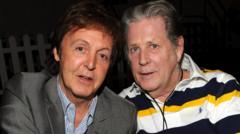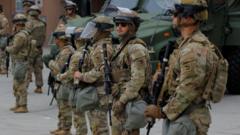The death of Pope Francis at 88 has sent shockwaves through the Catholic Church and the wider world. Tributes pour in from esteemed leaders, echoing his commitment to social justice, climate advocacy, and compassion for the disenfranchised. As the Vatican prepares for the crucial task of choosing his successor, Francis’ impact on the Church and society remains a focal point of discussion.
Mourning a Legacy: The World Reflects on Pope Francis’ Passing

Mourning a Legacy: The World Reflects on Pope Francis’ Passing
Global leaders and mourners gather in solidarity as the world reflects on the life and legacy of Pope Francis, who dedicated his life to championing the marginalized and promoting compassion.
The news of Pope Francis' death on April 21, 2025, at age 88 has reverberated throughout the globe, prompting an outpouring of grief and tributes from leaders and followers alike. Known for his steadfast advocacy for the marginalized, his calls for climate action, and his deep compassion for the impoverished, Francis leaves behind a transformative legacy that has influenced the hearts and minds of many.
Cardinal Kevin Farrell announced the pope's passing in a somber early morning statement: “At 7:35 this morning, the Bishop of Rome, Francis, returned to the house of the Father.” The news came as a shock to many gathered at St. Peter’s Square, as just a day prior, he had appeared, albeit in a wheelchair, to bless the faithful on Easter Sunday.
In the immediate aftermath, crowds of supporters and mourners spontaneously gathered in and around key sites in Rome. They reflect the profound impact of Francis, who consistently advocated for the vulnerable, advocating for migrants and speaking against the injustices that plague the modern world. Mourners like Marco Volpi expressed disbelief: “We saw him yesterday. We did not expect such a tragic ending.”
Global reaction has been swift, with leaders from various nations celebrating his dedication to the poor and his push for social reforms. His papacy marked a significant turn towards inclusiveness, aiming to revamp the Church’s image. His efforts to confront the church's sexual abuse crisis and promote transparency in financial dealings crafted a path towards healing and accountability.
As the world continues to mourn, discussions of who will succeed him commence within the Vatican. The College of Cardinals is grappling with the pressing question of whether to continue his legacy of openness and progression or to revert to more traditional, conservative practices. The conclave to elect his successor is anticipated within the next few weeks.
Francis' health challenges in recent years were evident to the public, yet his unyielding spirit was displayed in his final public days. One day before his death, he valiantly blessed thousands gathered to celebrate Easter, a testament to his devotion even in frail health. His last remarks emphasized compassion for marginalized communities, further underscoring his enduring principles.
Among those sharing memories of the pope is former President Barack Obama, who stated, “He shook us out of our complacency and reminded us that we are all bound by moral obligations to God and one another.” His approach to intercultural dialogue and collaboration signifies the need for modern leaders to unite, echoing the sentiments of many faithful who flocked to services across the United States in remembrance.
As the days unfold, the Church’s faithful worldwide will continue honoring his legacy, while looking ahead to the essential task of selecting a leader equipped to navigate the moral complexities and challenges that define our time.
Cardinal Kevin Farrell announced the pope's passing in a somber early morning statement: “At 7:35 this morning, the Bishop of Rome, Francis, returned to the house of the Father.” The news came as a shock to many gathered at St. Peter’s Square, as just a day prior, he had appeared, albeit in a wheelchair, to bless the faithful on Easter Sunday.
In the immediate aftermath, crowds of supporters and mourners spontaneously gathered in and around key sites in Rome. They reflect the profound impact of Francis, who consistently advocated for the vulnerable, advocating for migrants and speaking against the injustices that plague the modern world. Mourners like Marco Volpi expressed disbelief: “We saw him yesterday. We did not expect such a tragic ending.”
Global reaction has been swift, with leaders from various nations celebrating his dedication to the poor and his push for social reforms. His papacy marked a significant turn towards inclusiveness, aiming to revamp the Church’s image. His efforts to confront the church's sexual abuse crisis and promote transparency in financial dealings crafted a path towards healing and accountability.
As the world continues to mourn, discussions of who will succeed him commence within the Vatican. The College of Cardinals is grappling with the pressing question of whether to continue his legacy of openness and progression or to revert to more traditional, conservative practices. The conclave to elect his successor is anticipated within the next few weeks.
Francis' health challenges in recent years were evident to the public, yet his unyielding spirit was displayed in his final public days. One day before his death, he valiantly blessed thousands gathered to celebrate Easter, a testament to his devotion even in frail health. His last remarks emphasized compassion for marginalized communities, further underscoring his enduring principles.
Among those sharing memories of the pope is former President Barack Obama, who stated, “He shook us out of our complacency and reminded us that we are all bound by moral obligations to God and one another.” His approach to intercultural dialogue and collaboration signifies the need for modern leaders to unite, echoing the sentiments of many faithful who flocked to services across the United States in remembrance.
As the days unfold, the Church’s faithful worldwide will continue honoring his legacy, while looking ahead to the essential task of selecting a leader equipped to navigate the moral complexities and challenges that define our time.






















